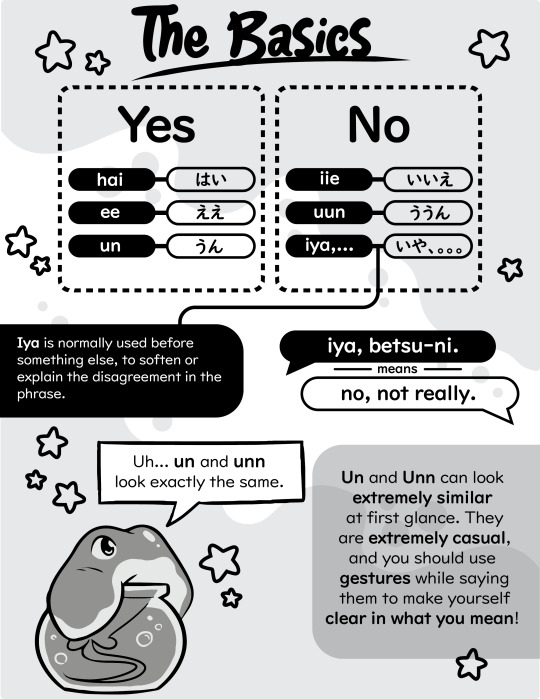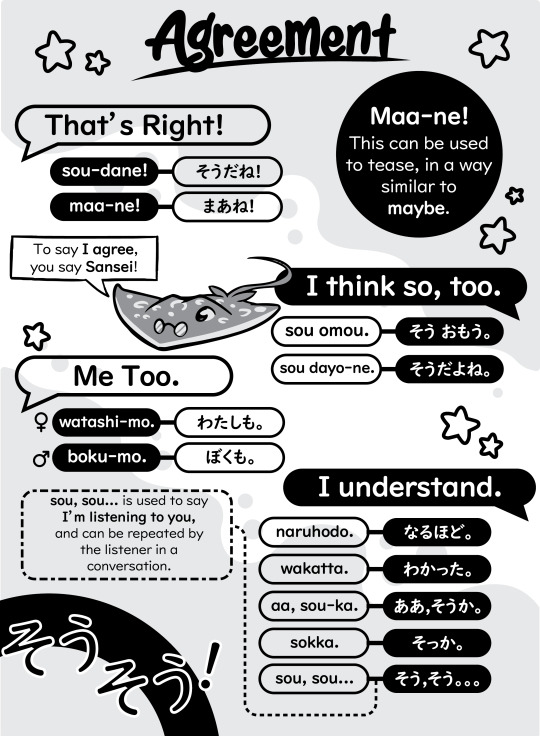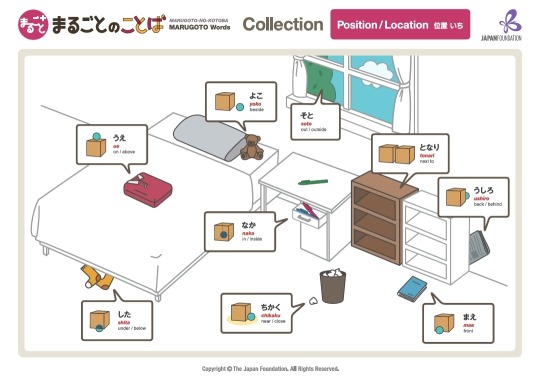Text
some food practice sentences
tengo hacer un pastel de fresa
no me gusta berenjena o calabacin.
cocinando ensalada frijole por el fiesta después
mi favorito frutas esta mango y melocotón. Pero también me gustan frambruesas.
No me gusta comidas picantes. soy gringo.
no como leche o carne.
0 notes
Text
wouldve been better without romaji! people cant learn japanese if you use romaji, just stick to hiragana.





2K notes
·
View notes
Text
Assortment of random Japanese words I‘ve learned since arriving here without studying
足元(あしもと)- at one’s feet, underfoot (heard over a tannoy announcement at the station warning passengers to take care when boarding the train)
参る(まいる)- to come, to go (humble) (they never say “電車がきます” when the train’s arriving; it’s always “電車が参ります”)
まもなく - soon (humble) (again, they never say “もうすぐ” on the train; it’s always まもなく. To the point where I actually forget もうすぐ and end up saying まもなく to my teacher and she laughs at me)
最高の(さいこうの)- the best (from My Hero Academia, because they say “the best hero” literally all the time, and at first I was like “you want to be a psycho hero? What??”)
残念(ざんねん)- unfortunate, too bad (randomly heard on the radio and recalled I’d looked it up recently, and then heard it again a couple of times in anime)
さすが - as expected of (hear it in My Hero Academia aaaaall the time)
揚げ鶏(あげどり)- Japanese-style fried chicken (I asked the cashier how to pronounce it when I ordered it)
本線(ほんせん)- mainline (I hear this literally every time I use the local trains because it’s the name of the line, but I only just figured out what it means)
鼻水(はなみず)- snot (lit. nose water) (hear this all the time when kids want a tissue. They just come up to me and say “先生。鼻水” and I’m like ok gross just go get a tissue you don’t have to ask me)
おっぱい - boobs (heard in class as I got groped by a five-year-old girl, double-checked the meaning on the way home)
甲虫(かぶとむし)- rhinoceros beetle (they’re on one of the videos we put on for the kids when they’re coming into the class and they all just say “kabutomushi” whenever it comes up on screen)
かぶと - a particular style of traditional Japanese helmet worn by ancient warriors (it’s in one of the pictures I had to use this term where I ask the kids “what can you see?” and every single class someone would point to it saying “kabuto”)

I was actually really confused the first time they said it because Kabuto is the name of a Pokemon (and not one I’d really expect them to know because it’s from the original 150 and hasn’t really featured in more recent generations) but it looks like this:

So I was like. Wtf there’s no Kabuto here, wtf are you on about?
133 notes
·
View notes
Note
hi - I’ve had trouble finding a satisfactory answer online for this: why is it that some adjectives precede the noun theyre describing? for example, “un buen profesor” or “la nueva maestra”. i love your blog and it’s helped me so much! thank you!!
Someone else asked a similar question that I have saved in my drafts I've been working on. I'll give you a short version before I go back to my drafts
Most adjectives go after the noun [el gato negro "the black cat", la luna llena "full moon" etc]
When regular adjectives go before the noun it reads as very exclamative and flashy, as if that adjective were in bold or italics. Full on extra emphasis [as in: El maravilloso mago de Oz "the wonderful wizard of Oz" which reads as "the wondrous" or "the marvelous" rather than simply "great" or "wonderful" in a traditional sense]
Some nouns change meaning depending on adjective placement; nuevo/a, and bueno/a are like that
More below...
-
Another basic example: es una historia larga "it's a long story" vs. es una larga historia "it's a SUPER long story"
In the case of nuevo/a if it comes after the noun it means "brand-new" like "never been used before"
If it comes before the noun it tends to mean "newest" or "latest"
As an example:
la nueva maestra = the new teacher [f] / the teacher [f] who was just hired
la maestra nueva = the new teacher / the rookie teacher
If I saw la nueva maestra I would tend to think "just hired", if I see la maestra nueva I get the sense she's a teacher who doesn't really know how to teach but that might just be me
Other adjectives like this are mismo/a where la misma cosa is "the same thing" vs. la cosa misma "the thing itself"
A really common one is triste like if you see triste in front it means "dreadful", if you see it behind it's just "sad"
And there's antiguo/a, bueno / buen, buena, grande / gran, viejo/a, mismo/a, nuevo/a, mal / malo/a, triste, etc.
-
In the case of bueno/a which is honestly more confusing, this is the way I was taught:
un buen amigo = "a good friend" = he was good as a friend
un amigo bueno = "a kind friend" = he was a good person who was also my friend
Similarly there's malo
un mal amigo = "a bad friend" = a friend who is not a good friend
un amigo malo = "a bad friend" = a friend who is a bad person
But there are certain expressions or set "collocations" [a set word phrase] that use them a certain way like un buen augurio "a good omen" vs. un mal augurio "a bad omen / an ill omen"
183 notes
·
View notes
Text
ive started studying spanish while at work so here's some words i learned recently
coser - to sew
lavantar - to pick up (most inoffensive lol)
(re)coger - to pick up
organizar - to organize
doblar - to fold
una cosa - a thing
1 note
·
View note
Text
Restaurant/ shopping vocabulary
…けっこうです- I don’t need.. ( レシートはけっこうです.- I don’t need a receipt)
ふくろ/てさげぶくろ - carrier bag
レシート/ りょうしゅうしょ- receipt
おかいけいは…- Your total is…
何かおさがしですか- may I help you?
おまたせいたしました- sorry to keep you waiting
ごちゅうもんは おきまりですか?- have you decided on your order?
なにをめしあがりますか- what would you like to eat?
なにになさいますか- what would you like?
まだきめていません- I don’t know yet
… おねがいします- Please can I have …
おのみものは?- and to drink?
おのみものはなにがいいですか- have you decided on your drink?
もちかえりで- take out
おかえしです- change (in cash transaction)
いじょうで よろしい ですか?‐ is that all?
これで おねがいします- just these please
前菜-ぜんさい- starter
メイン- main course
付け合わせ料理- つけあわせりょうり- side dish
豚肉- ぶたにく- pork
牛肉- ぎゅうにく- beef
おかんじょうをおねがいします- the bill please
おいくらですか- how much is it?
カードでおねがいします- pay by card please
かしこまりました- right away/ yes sir/ma’am
みているだけです- I’m just looking
しちゃくしてもいいですか- can I try this on?
しちゃくしつはどこですか- where are the changing rooms?
ほかにおさがしのものはありますか?- are you looking for anything else?
まもなくのへいてんのじかんです- we are closing soon
いまあいてますか?- are you open?
318 notes
·
View notes
Text
I noticed in Japanese that people will say いい匂いする when they smell something good, and I wondered why it wasn't いい匂いしてる, since you're currently smelling it, so it should be in present continuous form.
But then I realised. English does the same thing. We don't say "I'm smelling something good", we say "I smell something good". I tried to think of other verbs that behave in the same way, and I came up with: see, taste, feel, hear (note: all 5 main senses), think, understand, know, sympathise, get along (with someone), like.
Besides the sense-based verbs, the other verbs all indicate stability. The verb is being done and it will stay that way unless otherwise disturbed.
e.g. "I think jellyfish are cool (and I will most likely still think this in 5 years)".
They also imply at least a small amount of time in the past spent in this state.
e.g. "I understand how an internal combustion engine works (and I have understood this for at least a few hours already)"
But the sense verbs seem like an exception. They don't necessarily indicate a stable state."I smell dog shit" doesn't imply that you'll continue to smell dog shit for any amount of time - you probably just walked past it and on your next whiff you might not smell it at all.
A bit of googling led me to this really cool paper which explains that these sense based verbs are stative verbs and therefore they are used to declare something about your own state (and also can't usually be used in the progressive aspect, although there are exceptions which is what the paper is about). This makes me think that all of the verbs I mentioned above are exactly the same, and that it's not the tense or aspect that implies the continuous state of jellyfish love, it's just a coincidence that all of those verbs generally tend to be long lasting states.
134 notes
·
View notes
Text
it’s so bizarre when animated American films are set in a certain location and then only certain characters have the accents of that place. It makes no damn sense!! like

WHY IS SHE MORE FRENCH THAN THE REST OF THEM???
257K notes
·
View notes
Text

A third 江 name in a row! I'm on fire! But LOTS of readings this time: 近江 can be read Ōmi, Chikae, Ōe, Onoe, Konoe, Kōmi, Niie, or Nobue. Especially remember Ōmi, I think; non-intuitive region but it's the former name of Shiga Prefecture so it's likely to be top of mind.
近 is a character I can't believe we haven't covered yet! It means near(by), early, akin, or tantamount, and it's read chika.i, kin, or kon.
江 means creek, inlet, or bay. It can be read kō or e. See the last few days (or search 江) for more on radicals and vocab, but what I like here is the symmetry between 近 and 江. Each is made up of two radicals, both of which look similar to but are distinct from one another! 辶 go/road is to氵water as 斤 axe is to エ craft... no? Extra strokes on the bottom, extra strokes on the top......? I don't know, but there's something there!
14 notes
·
View notes
Photo


161006 - My favorite method of remembering Mandarin vocab! This is honestly so effective and useful for other languages too~
5K notes
·
View notes
Note
In Duolingo there are many sentences like the following one that confuse me: “¡Señor, pruebe este vino!” Why isn’t the word “usted” used?
Short Answer: It's implied here, the usted isn't needed. Commands don't always need the pronouns.
You COULD use a pronoun if you wanted, it's just emphatic with commands but it's not wrong.
-
Longer Answer...
Spanish doesn't typically include the subject unless it's unclear, but in this particular case you're addressing someone directly so it can only be 2nd person and with the señor it implies singular so it could be tú or usted
In neither case do you specifically need the pronoun because when you're addressing someone directly in a command they know you're talking to them. Adding the pronoun adds extra emphasis.
This is because commands only exist in tú commands / usted commands "you", in plural "you all" which could be ustedes or vosotros, OR as a nosotros command which reads as "let's" [probemos el vino sounds like "let's try the wine"].
In no case are you unsure of who the person is that you're talking about
The usted would make more sense in a regular declarative statement like prueba el vino might be "he/she tastes the wine" or "you taste the wine" so you could say usted prueba el vino "you try the wine" to be specific
...But in your example, that's a command and commands only really use pronouns for added emphasis like pruébalo tú sounds like "you try it" or "you go ahead and try it" or "why don't you try it"
In theory, you could use tú but more formal polite Spanish has you using usted with people you don't know, customers/clients, and people older than you or socially above you
By using señor they're implying that you're being more respectful so the usted is implied and not needed
If you did want to include it, it would be: ¡Señor, pruebe usted este vino!
Or a more emphatic - Pruébelo usted same as above "you try it" or "you go ahead and try it" etc. This would be like "go and try it for yourself" with extra oomph. That's how commands feel with the commands.
30 notes
·
View notes
Text
オチ ochi
Nope, it doesn’t mean ‘fall’, as in 落ちる (ochiru).
When written in katakana, ‘ochi’ usually means ‘punchline’, as in the part of the story that makes a joke (or even rakugo, traditional Japanese storytelling) funny.
For example, the story of a traveler who stayed with an old couple in the countryside, who overheard them saying they’d give him ‘hangoroshi’ (a beating to death) in the morning. When he woke up, he went to flee, but rather than kill him, the old couple presented him with ‘hangoroshi’, a term in the local dialect referring to a sweet made with half-mashed mochi rice and red bean paste. This resolution to the confusion is the ‘ochi’, or punchline, of the story.
105 notes
·
View notes
Text
sometimes i get annoyed when the dictionary is like "oh yeah, this word can be written 過ち(あやまち)and 誤ち" and not elaborate further. like, there are two different kanji, there must be a difference, right?
(ps. yeah there is. 過ち will imply error in moral judgement. 誤ち will imply accidental mistakes.)
191 notes
·
View notes





